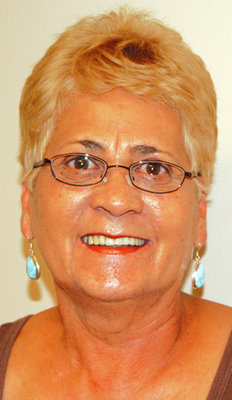NEWS
Shaw leading housing authority
LUMBERTON — A longtime member of the Lumberton City Council is running the Lumberton Housing Authority, which recently received a scathing letter from federal officials alleging problems with spending.
“I’m learning as I go,” said Robert Delane Shaw, the chairman of the authority’s board of directors the past four years. “We’re still trying to maintain and provide services in the most expedient and efficient way we can.”
Shaw took over when James Meacher, who served as the Lumberton Housing Authority’s executive director for 33 years, retired on Feb. 25. The former executive director announced his retirement at a meeting of the authority’s board of directors.
Meacher retired just a little more than two weeks after the U.S. Department of Housing and Urban Development told the local agency not to spend or obligate any federal money without first getting HUD approval because of a concern “about the possible improper expenditures of funds.”
“I think that might have encouraged him to retire at this time,” Shaw said when asked if HUD’s action was a factor in Meacher’s departure. “He may have felt it was the best thing to do before being asked to.”
Shaw, who along with other housing authority personnel was called to task in Wednesday’s Our View in The Robesonian for not supplying the paper with public information, walked into the newspaper office Wednesday morning and discussed with a reporter issues currently facing the authority. He said that his phone had been out of order and he had not received several messages from The Robesonian requesting information.
Shaw said that Meacher’s departure has resulted in “frustration and uncertainty” among staff who are used to working with the longtime director. He said that until a new executive director can be hired that he — as chairman of the authority board — is fulfilling administrative duties usually performed by the executive director.
Shaw said that the board is in the “process of studying” what needs to be done to get a new executive director hired.
“If I had my way, I’d like to have a director hired right away, within 30 days,” he said.
Meacher was making a salary of $103,192 a year.
Shaw said that the Lumberton Housing Authority oversees 729 conventional housing units. He also said that the authority has within its jurisdiction 596 homes that are classified as Section 8.
The current priority of the board, according to Shaw, is to respond to HUD’s concerns. The federal agency has given the authority 30 days to respond.
“This correspondence concerns the Lumberton Housing Authority’s violation of conflict-of-interest requirements, lack of adequate controls over its disbursements, and failure to maintain an adequate control system as outlined in the report of the Office of Public Housing,” Michael A. Williams, director of Public Housing for HUD’s Greensboro field office, wrote in a Feb. 6 letter to Meacher. “Due to LHA’s failure to administer some of its HUD funds in accordance with the the requirements, this office is concerned about the possible improper expenditures of funds.”
HUD has ordered that the local authority submit copies of all bills, invoices and receipts to its office before expending or obligating any funds by check, cash or promissory note. HUD is also requiring that the local authority submit for review related information before awarding and executing any contracts or making and hiring and firing decisions.
Shaw said that HUD’s concerns result from an on-site inspection in March 2012. He said that the authority’s board members were just recently made aware of the report, although HUD officials contend it was given to Meacher previously.
“There is some confusion over whether or not the executive director did receive this report,” Shaw said. “Nothing was mentioned to the board … . We were wondering where the plan was. In our opinion, it was overdue.”
Shaw said that the local board will probably have to request a 30-day extension to complete its review and respond to all of HUD’s concerns.
Shaw served four terms on the Lumberton City Council as the District 5 councilman before being defeated by John Cantey in the 2005 municipal elections.

Speaker: No go on Brooks’ nominee
PEMBROKE — Lumbee Tribal Chairman Paul Brooks will have to come up with a new nominee for tribal administrator, according to Pearlean Revels, speaker for the Lumbee Tribal Council.
Brooks, however, said Tuesday through tribal spokesman Alex Baker that he has no intention of withdrawing his nomination of Steven Hunt as his choice to fill the position.
Late last month, Brooks submitted to Tribal Council members his candidate for tribal administrator, asking that Hunt, a 46-year-old Pembroke resident, be confirmed as “soon as possible and put to work.”
Brooks told the council when making his nomination that Hunt, manager of the Tredegar Film Products plant in Red Springs, is the only person he plans to recommend for the position that is responsible for overseeing the day-to-day operations of the tribe.
Revels said that during an interview with Hunt on Feb. 26 there were several council members who had “some problems” with the candidate. Although Revels would not be specific about the concerns of council members, she acknowledged that the issues raised would most likely prevent Hunt from receiving enough votes to be confirmed as administrator.
Numerous attempts to reach Hunt for comment for this story were unsuccessful.
Although the tribal chairman has the authority to hire the administrator, the tribe’s constitution requires that the 21-member Lumbee Tribal Council approve that individual. Revels said that Brooks now has 45 days under tribal law to bring another candidate for administer before the council for its consideration.
But Ed Brooks, the tribe’s attorney, told The Robesonian last year that a tribal chairman meets the tribe’s constitutional requirements for filling the administrator’s position as long as he makes a nomination and then does not withdraw his candidate’s name.
The tribe has been without a tribal administrator for about two years. Rose Marie Lowry-Townsend, whose contract was not renewed by the council following allegations that she and former Tribal Chairman Purnell Swett mismanaged tribal money, was the last to hold the position.
Hunt is the second candidate that Brooks has brought to the council for confirmation as tribal administrator since taking office in November 2011. The council last year twice denied his nomination of Gervais Oxendine, a Lumberton businessman, for the position. The council at that time told Brooks to bring forward more than one candidate for their consideration.
Hunt told council members when nominated for the administrator’s position that it would be his top priority to get the chairman and council to “work as one unit” so that the negative perception the public has of the tribe and its leadership can be changed.
Police ID body pulled from river
LUMBERTON — Lumberton police today identified the person whose body was pulled from the Lumber River as being a 21-year-old city man named Edward Oxendine Jr.
According to a statement from police Capt. Terry Parker, the identification came after the body was examined at the state Medical Examiner’s Office in Chapel Hill. The report found “no physical signs of trauma” to Oxendine’s body.
Oxendine lived on Mallard Drive, according to the statement, and was last seen on Jan. 17 in the early morning walking on Riverbrooke Lane in Lumberton after he left his girlfriend’s residence. His girlfriend reported him missing two days later to the Robeson County Sheriff’s Office.
Oxendine’s body was pulled from the river near the Second Street bridge on Monday about 12:15 p.m., shortly after someone in a canoe spotted it and called police. The body, which was fully clothed, was badly decomposed and had no identification on it.
The investigation is continuing. Anyone with information is asked to call Detective Dereck Evans, the lead investigator, at the Lumberton Police Department 910-671-3845.
I am a text block. Click on me to drag me around or click a corner handle to resize me. Click the settings icon (it's the left one, looks like a cog) to change this text. You can type new text into me or cut and paste text from somewhere else. Click outside of me when you're done and any changes will be saved.
Commissioners run up $5,600 bill at eateries
LUMBERTON — The Robeson County Board of Commissioners charged the county more than $5,600 for meals after board meetings between Jan. 3, 2012, and Jan. 17 of this year.
The Robesonian reviewed receipts for 18 restaurant visits at five Lumberton restaurants that totaled $5,619.14, an average of about $318 a visit. The most expensive visit totaled $431.32 at Outback Steakhouse, with the least expensive visit, totaling $90.52, at Denny’s.
Other restaurants patronized by the commissioners and administrator during that time period were Texas Steakhouse, Ruby Tuesday and Megami Japanese Restaurant. Outback was the favorite, with commissioners going there eight times.
If a commissioner had an alcoholic drink with his meal, he picked up that tab, not the county.
It has been a standard practice for years for the commissioners, along with the county manager, assistant county manager, county attorney to go out for a dinner after the board holds its regular monthly meetings. The commissioners charge the county for their meals despite having the highest stipend, $700 per month, of any county commissioners in the state. The county has no policy in place regulating how the stipend is to be used. It is paid each month as lump sum, and commissioners are not required to turn in receipts.
Members of the Lumberton City Council and the Public Schools of Robeson County Board of Education enjoy catered meals before their meetings, but council and school board members do not receive a stipend. The meal for council members averages about $175, according to City Manager Wayne Horne. The average cost of the meals for the Board of Education was not available on Friday.
The Robesonian attempted to contact all the commissioners to ask them why the county pays for their meals when they are receiving a $700 stipend each month. Commissioners Lance Herndon, Hubert Sealey and David Edge responded, and Commissioners Noah Woods, Raymond Cummings, Jerry Stephens, Tom Taylor and Roger Oxendine did not return a reporter’s phone call.
“I really haven’t given this much thought. It’s something that was already in place long before I came on the board,” Sealey said. “But if this is something the board wants to look at and change, I wouldn’t have a problem with it.”
Herndon also cited the long-standing tradition of county commissioners going out to a restaurant after their meetings.
“It’s always been a tradition and I just picked it up when I came on the board. This is a good opportunity for us to socialize,” he said. “Should the stipend be used to pay for meals? I would rather see the stipend be used to cover miles traveled and time spent doing county business.”
Edge said he doesn’t see it as a “problem” when the county picks up the tab for his meal after a meeting.
“It’s not that many times a year and it benefits the commissioners to have a chance to get together,” he said. “When I take my employees out to dinner, I always pick up the tab.”
CDC: Study needed on e-cigarettes
RICHMOND, Va. — Increased awareness and use of electronic cigarettes in the U.S. outlined in a study released Thursday highlights the need for government regulation and evaluation, the head of the Centers for Disease Control and Prevention’s office on smoking and health said.
Nearly six in 10 adults in the U.S. are aware of the battery-powered devices that heat a liquid nicotine solution and create vapor that users inhale, according the first study to assess the change in awareness and use of electronic cigarettes on a national level. The CDC report published in the journal Nicotine & Tobacco Research also said about one in five current smokers reported having used an electronic cigarette.
“These findings sort of tantalizingly underscore the need for more rigorous study of patterns of use of e-cigarettes and impacts,” Dr. Tim McAfee said in an interview with The Associated Press. “Until there’s regulatory authority and oversight, it’s going to be more difficult to be certainly reassuring around things like toxic effects.”
Some of the nation’s largest tobacco companies have gotten into the e-cig market as part of the industrywide push to diversify beyond the traditional cigarette business. Reynolds American Inc., the second-biggest U.S. cigarette maker, has begun limited distribution of its first electronic cigarette under the Vuse brand. Lorillard Inc., the nation’s third-biggest tobacco company, acquired e-cigarette maker Blu Ecigs in April. Some e-cigarettes are made to look like a cigarette with a tiny light on the tip that glows like the real thing.
The Food and Drug Administration says e-cigarettes have not been fully studied. The federal agency is expected to assert regulatory authority over e-cigarettes later this year to treat them the same as traditional cigarettes and other tobacco products.
The FDA has said its tests found that the liquid in some electronic cigarettes contained toxins besides nicotine as well as cancer-causing substances that occur naturally in tobacco. But some public health experts say the level of carcinogens was comparable to those found in nicotine replacement therapy, because the nicotine in all of the products is extracted from tobacco.
According to the results of a series of online surveys, the CDC reported that awareness of electronic cigarettes increased from 40 percent in 2010 to nearly 60 percent in 2011, and use among adults doubled to 6 percent during that time. The share of current smokers who said they have used an e-cig grew from 10 percent to about 21 percent, and from 2.5 percent to 7.4 percent for former smokers.
McAfee said the motivations behind e-cigarette use remain unclear. For example, a former smoker could be experimenting with them as a new nicotine delivery system, or could have used an electronic cigarette to quit smoking regular cigarettes. Current smokers might be using e-cigs in places where tobacco smoking isn’t allowed.
More than 45 million Americans smoke cigarettes, and about half of smokers try to quit each year.
First marketed overseas in 2002, e-cigarettes didn’t become easily available in the U.S. until late 2006. Now, the industry has grown from the thousands of users in 2006 to several million worldwide. Analysts estimate sales could double to $1 billion in 2013. Some companies have even started running TV commercials.
Devotees tout e-cigs as a way to break addiction to real cigarettes. They insist the devices address both the nicotine addiction and the behavioral aspects of smoking — the holding of the cigarette, the puffing and exhaling something that looks like smoke — without the more than 4,000 chemicals found in cigarettes.
“The bottom line is … the impact of e-cigarettes on public health remains uncertain,” McAfee said.
Who tops the list of biggest consumer complaints in NC?
Consumers filed more than 23,000 complaints with the N.C. Attorney General's Office last year about telemarketers, lenders, health care and other businesses.
That was up 25 percent from 2011, according to the state.
More than a quarter of last year's complaints - 6,126 - concerned unwanted telemarketing calls. Many consumers said they were receiving calls despite having placed their phone numbers on the do not call registry. Others said they were receiving pre-recorded advertising pitches, which are illegal.
Attorney General Roy Cooper wants stronger penalties for telemarketers who violate the law, his office said. His staff has pursued violators and managed to shut some down with the help of information in consumer complaints. Cooper's office said it has been battling DISH Network in federal court for three years over its telemarketing activities and expects the case to have a major impact on enforcement of the do-not-call laws.
Lending issues drew the second-most complaints - 4,314 in all. Cooper's office said consumers complained about issues such as interest rate hikes, charges for late payments and foreclosure relief scams. Cooper is fighting a proposal to allow payday lending to return to North Carolina.
Another 3,418 complaints - the third highest number - concerned fraudulent telemarketing activities where scammers attempt to hustle consumers out of money, personal information or both. Popular schemes included phony sweepstakes and lotteries, fake government grants, counterfeit check scams and sweetheart scams.
Cooper's office works to unravel such schemes and has negotiated agreements with money-wiring companies to make it harder for scammers to use their services.
Health-care businesses drew 1,663 complaints. Common complaints concerned problems with charges for weight-loss products and other services, hearing aids, medical equipment and billing or collection practices. The office noted that the consumers can now file complaints about their health insurance with Health Insurance Smart NC at 877-885-0231.
Another 1,477 complaints concerned home construction and repairs; 1,402 were about motor vehicle purchases and repairs; 1,387 were about credit and collections issues; 944 were about cable or satellite TV service providers; 845 were about Internet issues, including service providers, unsolicited emails, computers and online auctions; and 747 were about telephone or cell phone services.












